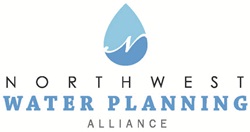On June 5, I spoke on a panel after a screening of Last Call at the Oasis, an informative, but not particularly upbeat, documentary about global water challenges. The word "crisis" was used a lot, including in the post-screening Q&A, and on one hand it's for good reason. Around the world we face immense problems of providing safe water for ecosystems to function, and for humanity to function comfortably within those ecosystems.
The truth is, we have a lot of water, but it's not always where we need it, when we need it, in a form that we can use (people with a less people-centered view would say that we are not where we should be, when we should be, making use of what's available to us.) As a result, most water problems are typically very localized, and that means solutions need to be as well. Conserving water in Australia doesn't somehow create additional water for anyone in China to use. So getting people all riled up about some global water crisis may be less productive then getting Australians riled up about Australia, and Chinese people motivated about China, and more likely, encouraging Chicagoans to use Lake Michigan water as efficiently as possible and folks in the Fox River watershed to protect that resource.
In the Q&A I was asked about how to get people in the Chicago region engaged in our water "crisis," and that's where I started to wince. In my mind, the Chicago region has a set of distinct, substantial, but ultimately manageable water resources management challenges. We can reduce combined sewer overflows to waterways and backups to basements, just as we can replace old infrastructure systems. We can eliminate wasteful consumption of finite water resources, and we can bring new sources — such as reclaimed water — online through technological and policy fixes. We CAN do all of those things, so the question is one of will rather than ability. To the extent that we have a "crisis," it is one of apathy, ignorance, or simply people having other priorities that seem (or really are) more pressing than our region's water challenges. However, our storms are getting larger, our pipes are getting older, and some of our finite water resources are being used at rates we cannot sustain. So today's crisis of apathy regarding our currently manageable challenges could easily become tomorrow's actual water resource crisis.
Yet I remain optimistic for a handful of reasons. For starters, the Illinois State Water Survey told me I should be optimistic in their recently-released final report supporting the creation of our region's water supply plan, Water 2050. One would be reasonable to question why the final science supporting our regional plan was released almost three years after the plan itself, but that brings us back to apathy. The Survey's budget is in constant limbo, and when you struggle to keep the lights on, you struggle to get reports done. Nonetheless, the final report is pretty straightforward about what needs to be done to sustain our region's water:
"The results of this study should be viewed with some optimism. This analysis suggests that the Fox River and Lake Michigan can accommodate demand from existing public water system recipients in Elgin, Aurora, and the Lake Michigan service area to 2050 and that additional water is available from both sources to satisfy demand elsewhere. Water may also be available from other inland water sources not examined for this study (e.g., the Kankakee River and shallow aquifers outside the Fox River basin), and these resources should be scientifically assessed in further studies. The present study identifies locations of potential water shortages that, with planning, can be offset by shifting demand to other sources and/or by reducing demand through such approaches as water conservation and reuse. Moreover, the present study has developed modeling tools and approaches that can be employed to simulate a range of alternative demand scenarios in support of an ongoing water supply planning effort in the region. There is time (from 10 to 30 years depending on the community) to pursue source and management alternatives, but since major construction projects and regional management plans take time to implement, planners should act now."

I added the italics, but nothing else. It boils down to a need for planning, foresight and coordination. MPC has been working with the Northwest Water Planning Alliance (NWPA) to develop shared, interjurisdictional strategies to sustain and wisely use Fox River and aquifer resources. At the moment we're surveying public works officials and planners in close to 80 municipalities in DeKalb, Kane, Kendall, Lake and McHenry counties on their preferences for a common lawn watering restriction to be adopted throughout the entire planning area. Our newest associate, Abby Crisostomo, has taken the lead on that for MPC and she's doing a great job (welcome to the MPC water team, Abby!). Of course, the devil is in the details, and even something as straightforward as lawn watering restrictions will take time, but NWPA is planning with foresight and coordination, and that's what we need (we also need better technologies, which is why I was happy to learn that the U.S. Environmental Protection Agency's WaterSense program just approved standards for irrigation controllers.) Once we resolve lawn watering inconsistencies (which will save immense amounts of water), we can turn our attention to issues like water loss controls and reporting, integrated water resources planning, pricing, and drought management.
So between the data, NWPA, WaterSense, and Abby ... yeah, I'm optimistic, but not delusional. The Illinois State Water Survey is giving us 10 to 30 years' warning, and so we need to get a 10 to 30 year head-start on avoiding this "crisis" we hear so much about.
One way to stay ahead of the game is to sign up for MPC and Openlands' What Our Water's Worth, a monthly e-newsletter about ways individuals, businesses and governments are investing in our shared water resources.